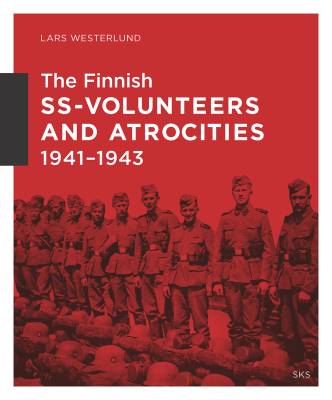The Finnish SS-Volunteers and Atrocities 1941-1943 — Against Jews, Civilians and Prisoners of War in Ukraine and the Caucasus Region 1941-1943
Westerlund, LarsProduct information
| Title: | The Finnish SS-Volunteers and Atrocities 1941-1943 — Against Jews, Civilians and Prisoners of War in Ukraine and the Caucasus Region 1941-1943 | ||
| Authors: | Westerlund, Lars (Author) | ||
| Product number: | 9789518581003 | ||
| Product form: | Paperback | ||
| Availability: | Delivery in 1-3 workdays | ||
| Price per piece: | 21,00 € (18,50 € vat 0 %) | ||
|
|||
| Publisher: | SKS Kirjat |
| Series: | Kirjokansi 222 |
| Edition: | 2019 |
| Publication year: | 2019 |
| Language: | English |
| Pages: | 248 |
| Product family: | History Society Books in English |
| Finnish library classification: | 90 HISTORIANTUTKIMUS. YLEINEN KULTTUURIHISTORIA YLEINEN SOTAHISTORIA. YLEINEN ARKEOLOGIA |
| YSO - General Finnish ontology: | SS-joukot, joukko-osastot, suomalaiset, sotilaat, vapaaehtoiset, itärintama (toinen maailmansota), sotarikokset, joukkomurha, holokausti, sotahistoria |
In the spring of 1941, Finland began to recruit volunteers to serve in the German Waffen-SS. After the perils of the Winter War of 1939-40, the Finnish government and the military high command wanted support against the continuing existential threat posed by the Soviet Union, even in the wake of the signing of the Moscow Peace Treaty. Only Germany had the means to provide such support in a situation where the Soviet Union had already occupied the three Baltic States (in June 1940) after seizing Eastern Poland the previous autumn.
Germany, meanwhile, had annexed and occupied Denmark and Norway, and had earlier taken the other half of Poland. Without a solution like this, Finland would have found herself alone and acutely vulnerable in the European war being waged.
The Finnish volunteers were placed in the Waffen SS-Division “Wiking”, which fought the Red Army in Ukraine and the Caucasus between 1941 and 1943. A total of 1,408 Finnish volunteers served in the various Wiking units. Of these, 256 were killed in action, 686 were wounded, and 14 were listed as missing. In the spring of 1943, the Finnish Volunteer Battalion was disbanded, and the officers and men returned to Finland.
In the latter stages of Finland's Continuation War with the Soviet Union and in the short Lapland War of 1944-45, a further 113 of those who served in SS-Division Wiking were listed among the fallen. National Socialist Germany had set both military and political-ideological objectives for its drive into the Soviet Union in June 1941. The liquidation of Jews was systematic, and a great part of the Russian POWs who were captured were summarily shot. The civilian population in the communities along the route of advance faced brutality and death on an unspeakable scale: entire villages could be ruthlessly razed to the ground as an act of revenge.
The responsibility for the industrial-scale slaughter rested in great part with the Einsatzgruppe C paramilitary death squads, which operated alongside SS-Division Wiking. The troops under the command of the Waffen-SS nevertheless had a duty to support the work of the Einsatzgruppen.
This report, carried out by the National Archives of Finland at the behest of the Prime Minister's Office, has gone through an extensive body of Finnish and international archive material. The actions of the Finnish volunteers have been followed where possible on a daily basis. Detailed examination of archive documents has permitted an image of what the Finns knew about the violent acts in Ukraine and the Caucasus, how they responded to them, and ultimately what was the Finns' role in the atrocities.
Germany, meanwhile, had annexed and occupied Denmark and Norway, and had earlier taken the other half of Poland. Without a solution like this, Finland would have found herself alone and acutely vulnerable in the European war being waged.
The Finnish volunteers were placed in the Waffen SS-Division “Wiking”, which fought the Red Army in Ukraine and the Caucasus between 1941 and 1943. A total of 1,408 Finnish volunteers served in the various Wiking units. Of these, 256 were killed in action, 686 were wounded, and 14 were listed as missing. In the spring of 1943, the Finnish Volunteer Battalion was disbanded, and the officers and men returned to Finland.
In the latter stages of Finland's Continuation War with the Soviet Union and in the short Lapland War of 1944-45, a further 113 of those who served in SS-Division Wiking were listed among the fallen. National Socialist Germany had set both military and political-ideological objectives for its drive into the Soviet Union in June 1941. The liquidation of Jews was systematic, and a great part of the Russian POWs who were captured were summarily shot. The civilian population in the communities along the route of advance faced brutality and death on an unspeakable scale: entire villages could be ruthlessly razed to the ground as an act of revenge.
The responsibility for the industrial-scale slaughter rested in great part with the Einsatzgruppe C paramilitary death squads, which operated alongside SS-Division Wiking. The troops under the command of the Waffen-SS nevertheless had a duty to support the work of the Einsatzgruppen.
This report, carried out by the National Archives of Finland at the behest of the Prime Minister's Office, has gone through an extensive body of Finnish and international archive material. The actions of the Finnish volunteers have been followed where possible on a daily basis. Detailed examination of archive documents has permitted an image of what the Finns knew about the violent acts in Ukraine and the Caucasus, how they responded to them, and ultimately what was the Finns' role in the atrocities.





